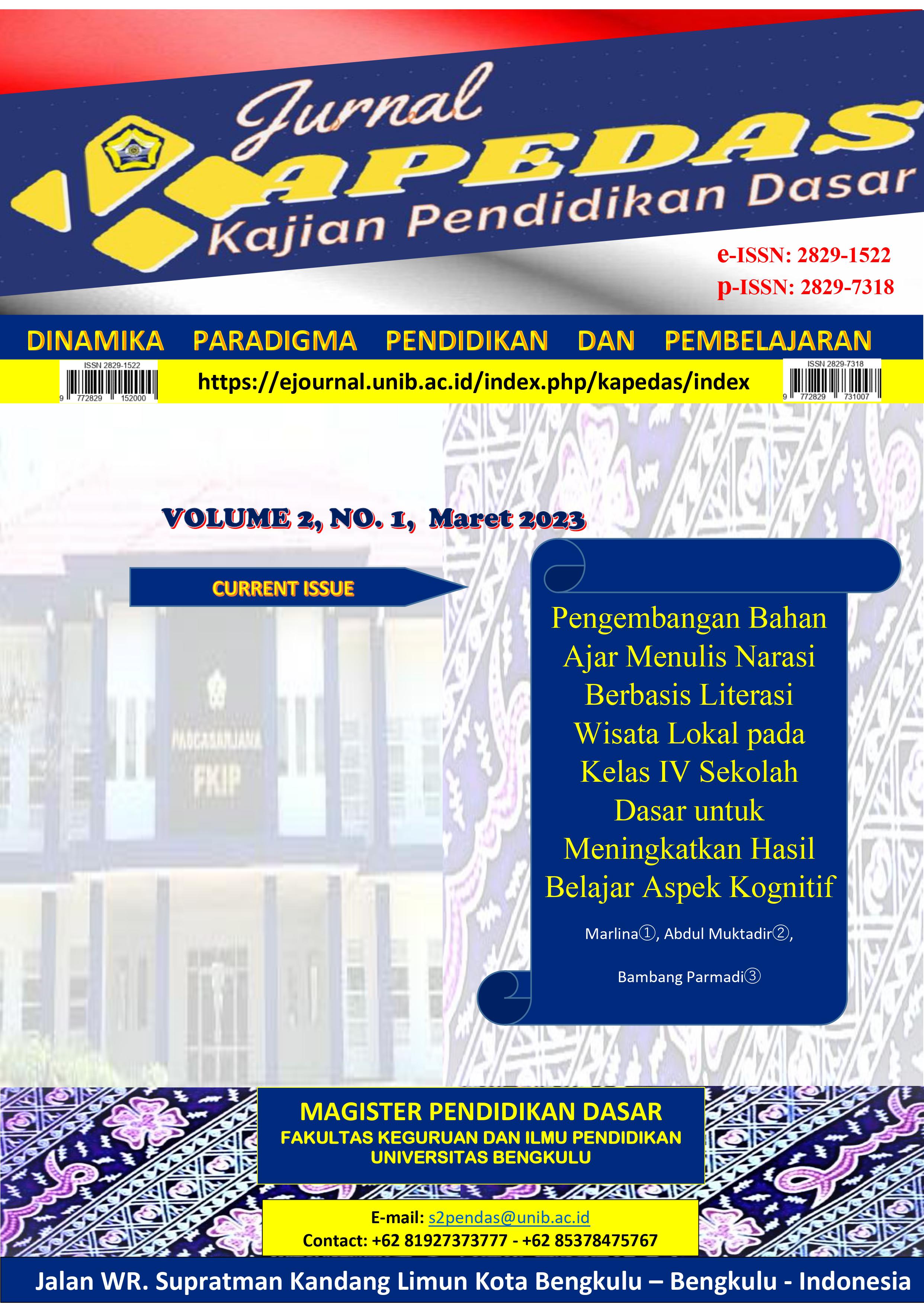Main Article Content
Abstract
This study aims to describe the elements of knowledge, context and science processes in the assignments in the 2013 Curriculum 2013 students' thematic books Themes 1 to 5 content of Science class VI Elementary School. This type of research is descriptive research. The object of this research is the elements of knowledge, context, and science process which are analyzed for their appearance in the 2013 Curriculum 2013 students' thematic books Themes 1 to 5 content of Class VI Elementary Science Science lessons. The research instrument is an analysis sheet of elements of knowledge, context and science processes. The data analysis technique used is descriptive. Appearance percentage category uses rater agreement percentage formula. The results showed that: 1) Elements of knowledge in the thematic books of science content for Class IV, namely indicators presenting concepts with an average percentage of 54.24% with percentage details in theme 1 of 50%, theme 2 of 50%, theme 3 of 54.55% , theme 4 of 50%, and theme 5 of 66.67%. (2) 18 appearances of the context elements of Theme 4 with the most indicators namely issues concerning natural resources 6 times (33.33%), issues concerning the environment 4 times (22.22%), issues about danger 2 times with a percentage of 11.11%, and indicators of issues regarding the boundaries of science and technology 6 times (33.33%). (3) Process elements in Theme 2 are 23 occurrences (76.67%), Theme 1 are 22 occurrences (73.33%), Theme 5 are 21 occurrences (70%), Theme 3 are 18 occurrences (60%), and Theme 4 with 17 occurrences (56.67%).
Keywords
Article Details
Copyright (c) 2023 Tri Lestari, Irwan Koto, Endang Widi Winarni

This work is licensed under a Creative Commons Attribution-ShareAlike 4.0 International License.

Karya ini dilisensikan di bawah Creative Commons Attribution-ShareAlike 4.0 International License .
References
- Abidin, Y., Mulyati, T., & Yunansah, H. (2017). Pembelajaran Literasi Strategi Meningkatkan Kemampuan Literasi Matematika, Sains, Membaca, dan Menulis, Jakarta: Bumi Aksara.
- Darwati. (2011). Pemanfaatan Buku Teks oleh Guru dalam Pembelajaran Sejarah: Studi Kasus di SMA Negeri Kabupaten Semarang. Paramita, 21 (1), pp. 76-89.
- Dewi, N.L.W.A., & Putra, I.K.D.A.S. (2022). Analisis Aspek Literasi Sains Pada Buku Tematik Pembelajaran Ipa Kelas VI Di Sd Negeri 2 Cempaga Tahun 2022. ORBITA: Jurnal Kajian, Inovasi, dan Aplikasi Pendidikan Fisika, Vo. 8 (2) pp.339-347.
- Kemdikbud. (2018). Permendikbud Nomor 37 Tahun 2018 Tentang Kompetensi Inti dan Kompetensi Dasar Pendidikan Dasar dan Menengah.
- Novita, Rita, Zulkardi, & Hartono, Y.. 2012. “Exploring Primary Student’s Problem-Solving Ability by Doing Tasks Like PISA’s Question.” IndoMS. J.M.E. 3(2): 133-150.
- Rahmadhani, Y. (2021). Analisis Kualitas Butir Soal Ujian Sekolah Mata Pelajaran IPA Berdasarkan Dimensi Pengetahuan Faktual dan Konseptual Ditinjau Dari Konten dan Konteks. JP3D (Jurnal Pembelajaran dan Pengajaran Pendidikan Dasar). 4 (1), pp.1-12.
- Stacey, Kaye. (2010). The PISA view of Mathematical Literacy in Indonesia. Jurnal on Mathetics Education (IndoMS). July, 2011, volume 2.
- Supriadi, H. (2016). Peranan Pendidikan dalam Pengembangan Diri Terhadap Tantangan Era Globalisasi. Jurnal Ilmiah Prodi Manajemen Universitas Pamulang, 3 (2), 92-119.
- Winarni, E.W., Karpudewan, M., Karyadi, B., & Gumono. (2022). Integrated PjBL-STEM in Scientific Literacy and Environment Attitude for Elementary School. Asian Journal of Education and Training, 8(2): 43-50.
- Yuliati, Y. (2017). Literasi Sains dalam Pembelajaran IPA. Jurnal Cakrawala Pendas, 3(2), 21-28.
References
Abidin, Y., Mulyati, T., & Yunansah, H. (2017). Pembelajaran Literasi Strategi Meningkatkan Kemampuan Literasi Matematika, Sains, Membaca, dan Menulis, Jakarta: Bumi Aksara.
Darwati. (2011). Pemanfaatan Buku Teks oleh Guru dalam Pembelajaran Sejarah: Studi Kasus di SMA Negeri Kabupaten Semarang. Paramita, 21 (1), pp. 76-89.
Dewi, N.L.W.A., & Putra, I.K.D.A.S. (2022). Analisis Aspek Literasi Sains Pada Buku Tematik Pembelajaran Ipa Kelas VI Di Sd Negeri 2 Cempaga Tahun 2022. ORBITA: Jurnal Kajian, Inovasi, dan Aplikasi Pendidikan Fisika, Vo. 8 (2) pp.339-347.
Kemdikbud. (2018). Permendikbud Nomor 37 Tahun 2018 Tentang Kompetensi Inti dan Kompetensi Dasar Pendidikan Dasar dan Menengah.
Novita, Rita, Zulkardi, & Hartono, Y.. 2012. “Exploring Primary Student’s Problem-Solving Ability by Doing Tasks Like PISA’s Question.” IndoMS. J.M.E. 3(2): 133-150.
Rahmadhani, Y. (2021). Analisis Kualitas Butir Soal Ujian Sekolah Mata Pelajaran IPA Berdasarkan Dimensi Pengetahuan Faktual dan Konseptual Ditinjau Dari Konten dan Konteks. JP3D (Jurnal Pembelajaran dan Pengajaran Pendidikan Dasar). 4 (1), pp.1-12.
Stacey, Kaye. (2010). The PISA view of Mathematical Literacy in Indonesia. Jurnal on Mathetics Education (IndoMS). July, 2011, volume 2.
Supriadi, H. (2016). Peranan Pendidikan dalam Pengembangan Diri Terhadap Tantangan Era Globalisasi. Jurnal Ilmiah Prodi Manajemen Universitas Pamulang, 3 (2), 92-119.
Winarni, E.W., Karpudewan, M., Karyadi, B., & Gumono. (2022). Integrated PjBL-STEM in Scientific Literacy and Environment Attitude for Elementary School. Asian Journal of Education and Training, 8(2): 43-50.
Yuliati, Y. (2017). Literasi Sains dalam Pembelajaran IPA. Jurnal Cakrawala Pendas, 3(2), 21-28.
